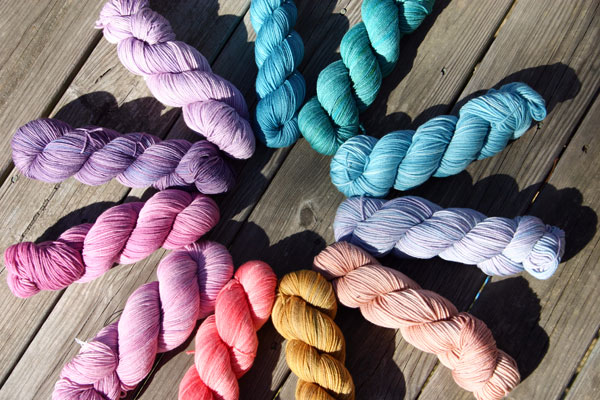The Alabama company is transitioning its manufacturing to the U.S., a surprisingly challenging venture.
By Christina Behnke
Almost three years ago, the team behind Kollàge Yarns took a business trip that changed their lives. Touring the overseas factory that produced their original Square knitting needles, they had an epiphany: What better way to control the quality of their product than to manufacture it themselves? The philosophy quickly expanded to their yarns as well. Company president Susan Moraca spoke to Associate Editor Christina Behnke about how she’s handled this challenging venture so far—and what’s on the horizon.
From yarns to Square needles, Kollàge is transitioning its entire line of products to be US-made. When and why did you decide to make this change?
Two and a half years ago, we decided to move production of our Square needles to the U.S. after spending a month in China. We realized that in order to have ultimate quality control, we needed to make all the parts ourselves and to carefully inspect them. It was not an easy decision and was quite expensive. We had no idea what we were getting into, but we knew that if we really wanted to do it, we would learn how. Now, I’m not saying that it’s been easy, but if we had the decision to make all over again, we would do the same thing.
After we came home, I made the decision not to [continue] purchasing yarn from China. I began searching for U.S. companies and getting an education on buying [wool] tops. Wow—I had no idea just how much I would have to learn!
Our ultimate goal is to have all of our yarns produced in the U.S. We are slowly making the transition. [My husband/business partner Mark and I] both feel very strongly about supporting American-made products and families.

Which yarns are included in the Made in America range?
Hope USA Cotton, an organic cotton grown and milled in the U.S., was my first venture. Unfortunately, the mill had to close, but I was lucky enough to purchase a lot of yarn before they closed and still have supplies.
We now have Happiness, so named because I was able to find the fiber in the U.S. and because every time I knit with it, as it slides through my fingers, it makes me happy. It is superfine 19.5 micron superwash wool, and comes in three weights—fingering, DK, and worsted—and is available in 30 tone-on-tone colors.
 How have you gone about finding U.S. manufacturers to produce the flagship yarns in your collection?
How have you gone about finding U.S. manufacturers to produce the flagship yarns in your collection?
I had a very dear friend who, six months after we opened our needle mill, proudly announced she wanted to open a yarn mill. We decided that when she was ready, we would love to work with her. She now has all the necessary equipment to handle our production, and it has been such a pleasure working with her. Her attention to detail is amazing.
Was the process different for finding a manufacturer for your Square needles?
Yes! Quite different. We do it all ourselves, except the anodizing, which is done 60 miles away.
I hate it when the size of your needle rubs off and you have to search for a needle gauge. We decided to purchase the equipment to permanently etch the needles so the sizes will never rub off. It sure makes life easier.
What are some of the challenges you’ve faced while making this transition?
Going into this venture, Mark and I did not realize that we had created two new full time jobs for ourselves. We work very long hours to continue to improve our day-to-day operations. We are no longer able to take any personal time off unless it’s a medical emergency—so no vacations for us! The expense of manufacturing in the U.S. is also very high, but we have been able to create ten new jobs here.
What’s next for you?
As for the yarn, I have my next fiber chosen, and we are beginning to work with it in regards to performance and the type of twist that most suits it.
Rumor has it that we will be making interchangeable needles. We are perfecting the connection so that they will not come apart. It’s a work in progress.
